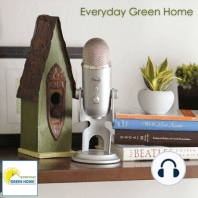10 min listen
Climate Crisis - Recycling Gone Awry
ratings:
Length:
34 minutes
Released:
Oct 20, 2021
Format:
Podcast episode
Description
Recycling has gone awry, and there is plastic everywhere! Do you sometimes forget to put recyclable items, like plastic soda bottles, pill containers, and the little plastic takeout cups and lids from takeout food, in the right place and end up throwing them out with the trash? Or have you ever had something that you would like to recycle, but you do not know what to do with it? I am Marla, the Green Home Coach! Today, I am excited to have my occasional co-host, Tony Pratte, AKA Tony, the Green Guy, joining me in my virtual studio for another episode in our series on the climate crisis, where we discuss convenience, where our plastic products come from, and tips you can use for better and wiser recycling! Creative solutions Even though Tony and I do not always see eye-to-eye on everything, we are not afraid of having difficult conversations. We are just as willing to talk about things we disagree on as we are about things we agree, to find creative solutions. Katharine Hayhoe Katharine Hayhoe is a well-known Texas-based climate scientist. She is encouraging people everywhere to open up the conversation about the climate crisis. Back in the day When Tony and I were growing up, we had to pay a deposit for the glass bottles the soda came in. We would get the deposit back again when we returned the empty bottles. We also had regular recycling drives in our neighborhoods. What has changed? Convenience, or taking the easy way out, has taken precedence over everything else, and many people do not think twice about throwing away single-use containers or packaging materials. Impatience Our lives have become more complicated. Most people are used to getting whatever they want immediately or getting instant responses from others whenever they try to contact them, so they have become impatient. As a result, they are unwilling to make a plan to recycle something and would rather throw it into the trash immediately. The unintended consequences of convenience There was an explosion of fast food in the 1980s. Since then, it became all about convenience, and we never stopped to think about the unintended consequences of what was happening. Plastic Plastic has had more unintended consequences than we ever imagined. Behavioral inertia As a result of getting used to doing things very easily, many of us now suffer from behavioral inertia when we need to change our habits. In a book I read, the author explains that it is far easier to change an existing habit than it is to start a new one. Swaps Get into the habit of swapping single-use or unrecyclable plastic items for items that can be reused or recycled sustainably. The numbers In the United States, in 2017, we produced 35,400,000 metric tons of plastic. Of that, only 11% got recycled. You cannot mix plastics that are to be recycled More than 70% of recyclable materials land up in landfills. That can happen because people throw items that are not recyclable into recycling bins, which could contaminate an entire batch of recycling. Another problem is that many municipalities have not been able to keep their recycling programs going or going as robustly as before. New types of plastic also complicate things by adding to the vast assortment of plastic products that we still need to figure out what to do with. What recycling means Recycling something means rescuing and processing the material it is made from to make something new. Driving the market We need to drive the recycling market by demanding more recycled products. That will motivate companies to provide more vibrant, sustainable, and financially rewarding recycling services. Virgin plastic The bulk of our virgin plastic gets made from petroleum. By recycling that plastic, we recycle the inherent value of those products. Where do our products come from? Supply chains have become globalized and very complex, so many of us do not know where our plastic products come from. We need to pay more attention to that and learn more about it. Cu
Released:
Oct 20, 2021
Format:
Podcast episode
Titles in the series (100)
Shabby Chick Natural Cleaners That Actually WORK with Amber Malcom: Shabby Chick and Everyday Green Home are partners Everyday Green Home and Shabby Chick Cleaners have partnered up, and today, we have Shabby Chick, Amber Malcom, with us to spend a few minutes talking about some of the seventeen Shabby Chick products... by Everyday Green Home
